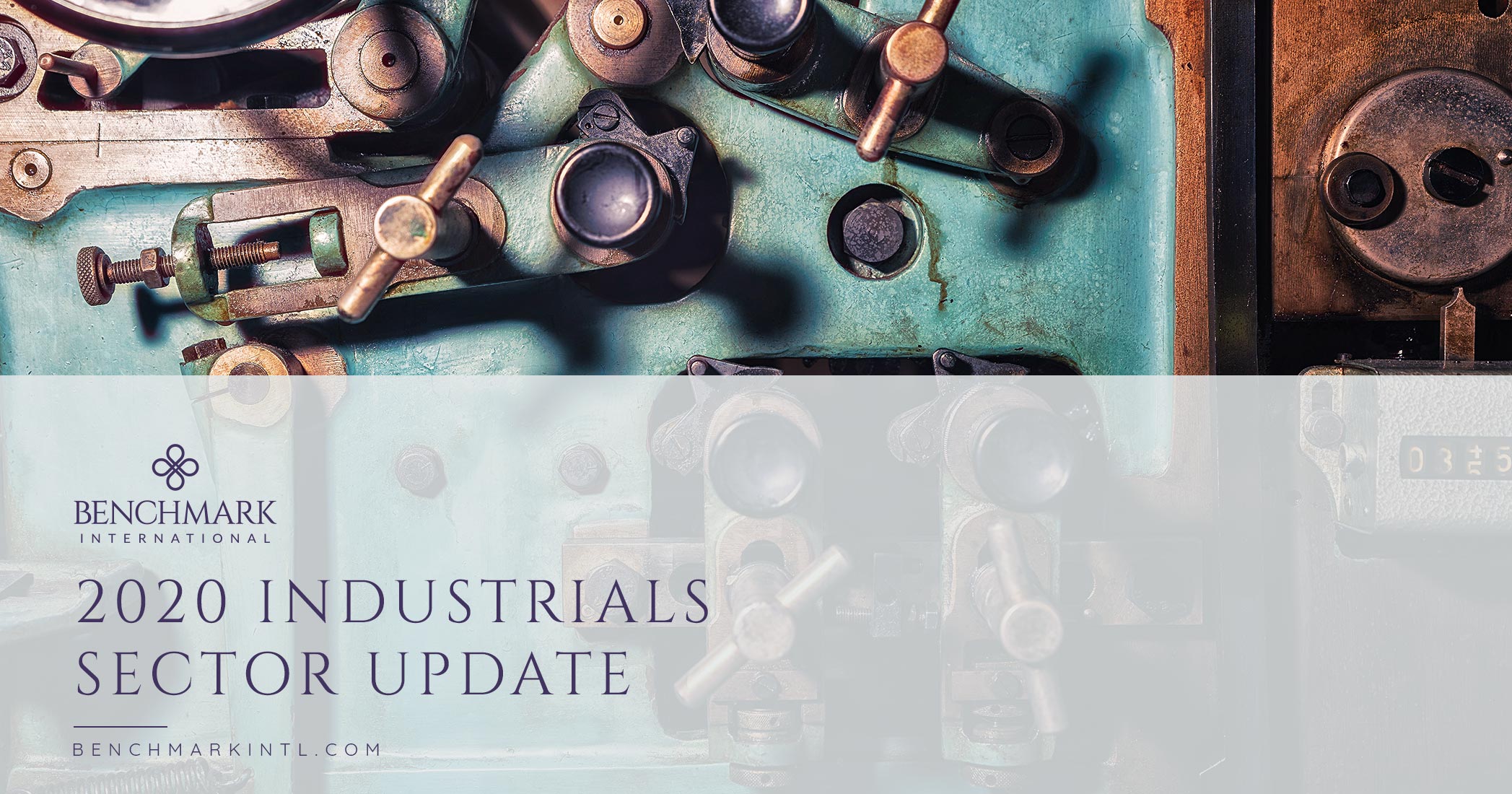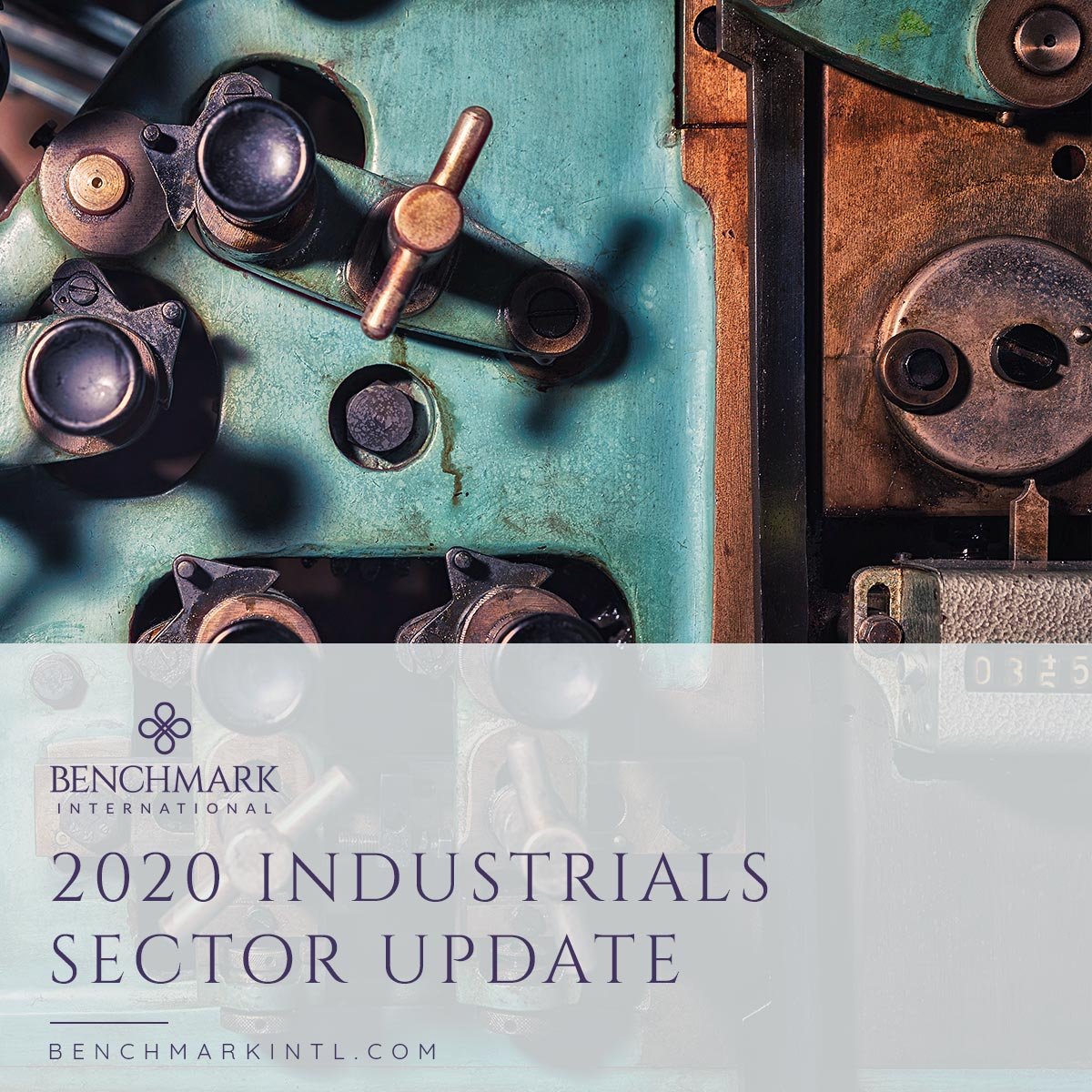
The industrials sector has had to adapt to significant disruption due to the global COVID-19 pandemic, and the challenges associated with it. While 2020 started on a very positive note with rapid growth for the global manufacturing sector, manufacturing output plummeted throughout the beginning of the year and into May due to shutdowns around the world. Output, new orders, exports, and purchases all fell to levels not seen since the 2008 recession. Many large manufacturing countries were under lockdowns into April, but restrictions were eased in May, which helped deter the overall rate of decline. In the wake of the crisis, many companies have found ways to evolve and use digital solutions to transform their business models, discovering changes that will continue to be beneficial in a post-COVID world. This adaptability is crucial to the survival and future relevance of these businesses.
Industry Highlights
- Automation and connective worker technologies have become even more important to boosting productivity.
- Migration to the cloud allows companies to be more flexible in dealing with disruptions.
- The auto manufacturing industry is growing more resilient due to greater supply chain visibility.
- For oil and gas companies, advanced digital technologies are a vital investment.
The Fourth Industrial Revolution
Industrial companies that made prior investments in digital technologies and IT infrastructure were able to operate efficiently during the earliest phases of the pandemic. The Fourth Industrial Revolution, also known as Industry 4.0, has enabled manufacturers to evolve their traditional supply chains and processes into highly interconnected systems. Leading organizations have been investing heavily in developed digital platforms specific to the industrials sector, pivoting business models towards being more software-centric. Additionally, smart manufacturing technologies are now transforming traditional manufacturing processes and paving the way into the future. More and more companies will be exploring digital technologies to enhance their flexibility and operate more innovatively. Robotics and 3D printing are among the most popular operational solutions that are expected to see continued heavy investment.
While remote work has become a relatively easy and normal option for many employees across different sectors, the industrial manufacturing sector is not one of them simply for logistics reasons. For example, machines need operators to keep them running. However, it has been demonstrated that technology can help limit the number of people needed to maintain operations.
Connected worker technologies are helping to streamline and hasten solutions. Typically, machine repairs require operators to contact service technicians, sometimes located in different facilities or at the original equipment manufacturer. Also, training new or existing workers has typically been face to face. Augmented reality is helping to eliminate in-person interaction for the purposed of repair, service and training and empowering workers to be more independent through digital on-demand access to manuals, instructions, and other resources.
While manufacturing companies tend to be more hesitant about migrating operations to the cloud, these organizations are realizing that cloud technologies enables them to move inventory, work smarter, customize products, and shift resources in much more flexible manner. The cloud is also an effective asset-performance tool that gives supervisors a remote window into facilities, production lines, and individuals.
Robotics and automation have significantly increased productivity for manufacturing processes. By replacing manual processes with automated alternatives, it helps to mitigate workforce availability challenges and reduces the impact of low-cost labor decisions.
Additive manufacturing and 3D printing continues to evolve and has shifted from the production of prototype applications to finished products. These manufacturing technologies are gaining more traction and offer efficient value chain solutions that enable on-demand production, less working capital, reduced supply chain complexity, fewer tools or parts needed, and less frequent human intervention.
The Auto Industry
Technology and connectivity is now the third most cited investment priority for the
automotive manufacturing industry. The future lies in edge computing, monitoring software, and the Industrial Internet of Things. Companies are able to collect and analyze data on site and in real time, connect applications to essential equipment, and conduct advanced monitoring and remote controls.
Another result of the pandemic for the auto industry is a need for more transparency in global supply chains. Thanks to AI, there is a shift from existing models in equipping automakers so that suppliers can use analytics to respond to changes in real time. For middle-market companies that have been known to underinvest in tech, this shift is especially important. Investment in IT infrastructure will help establish a more nimble and scalable environment, and will create more valuable data. The sequentially distributed databases of Blockchain technology are also changing supply chain management and adoption is expected to increase greatly into the future.
The Oil and Gas Sector
Digital technologies are also being adopted by oil and gas companies in order to bolster cost and operational efficiencies, improve safety, and reduce environmental impacts.
Robotics, AI, cloud solutions and Blockchain are all being used more and more to advance the industry. According to Bloomberg, oil companies are expected to spend $1.3 billion on advanced analytics alone in 2021. The big oil and field services companies with more experience aggressively adopting innovation and that are in favorable cash positions are more likely to continue investing in new tech. Human intervention is being scaled back. Maintenance procedures are being automated. Drones are being used to monitor real-time conditions and detect leaks. AI sensors are monitoring conditions such as temperature and vibration. At the same time, small and mid-size companies that were less mature coming into the pandemic are likely to focus spending on technology that helps them keep their businesses running.
Contact Us
No matter what sector your business operates within, Benchmark International is here to help. Contact us to discuss how we can help you grow or sell your business for maximum value.
Americas: Sam Smoot at +1 (813) 898 2350 / Smoot@BenchmarkIntl.com
Europe: Michael Lawrie at +44 (0) 161 359 4400 / Enquiries@BenchmarkIntl.com
Africa: Anthony McCardle at +27 21 300 2055 / McCardle@BenchmarkIntl.com
ABOUT BENCHMARK INTERNATIONAL
Benchmark International’s global offices provide business owners in the middle market and lower middle market with creative, value-maximizing solutions for growing and exiting their businesses. To date, Benchmark International has handled engagements in excess of $6B across various industries worldwide. With decades of global M&A experience, Benchmark International’s deal teams, working from offices across the world, have assisted hundreds of owners with achieving their personal objectives and ensuring the continued growth of their businesses.
Website: http://www.benchmarkintl.com
Blog: http://blog.benchmarkcorporate.com
 Benchmark International
Benchmark International  Benchmark International
Benchmark International 






